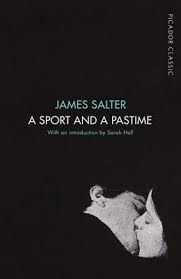
I don’t want to be the sort of person who is so woke they can’t enjoy a great book. Thus, I feel rather guilty to say I could not enjoy this beautifully written novel as much as I wanted to because YOU JUST DON’T ENCOURAGE TEENAGE GIRLS TO RELY ON THE RHYTHM METHOD. That it is the 1960s is no excuse, especially when you are a thiry year old man with family money and she is an eighteen year old shop girl from a small town.
That said, I do understand why it is considered a modern classic, and it does include the second most poetic description of anal sex I’ve ever read. (You will learn more than you want to about the first when I get round to THE LESSER BOHEMIANS by Eimar McBride). Here is a taste, but just a small one as this is a family blog:
In the morning it is calm. He awakens as if a fever has passed. Europe has returned to its real proportions. The immortal cities swim in sunlight. The great rivers flow. His prick is large and her hand moves to it as soon as her eyes open. He searches his clothing for the crumpled, leaden tube. He hands it to her. She looks at him impassively. He kicks the covers away as she unscrews the cap. She begins to spread it on. The coolness makes him jump. Afterwards she rolls over and in the full daylight he slowly inserts his gleaming declaration.
One of the stranger and more wonderful things about this blog is that it is written not from the perspective of the main couple, whose love story this is, but from that of his friend, and as he assures us: “I am not telling the truth about Dean. I am creating him out of my own inadequacies, you must always remember that.” It’s thus less a story of something that happened and more a story of someone’s painful imaginings of other people’s lives. This makes it a more complicated book than it at first seems. For example, here they are in a car.
In the great car that exists for me in dreams, like the Flying Dutchman, like Roland’s horn, that ghosts along the empty roads of France, its headlights faded, its elegance a little shabby; in that blue Delage with doors that open backwards, deep in the seats they drive towards home. The villages are fading, the rivers turning dark. She undoes his clothing and brings forth his prick, erect, pale as a heron in the dusk, both of them looking ahead at the road like any couple.
I just chose that snippet specifically for the heron bit of course. There are so many beautifully observed bits, and such carefully constructed sentences, there was almost too much to admire in this book. There is just such an impressive amount of work in it it almost got hard to read; I imagine Salter at his desk for years, to come up with these 200 pages. Here he is on seeing some people on a deserted street on a Sunday
Unexpectedly, like a band of survivors, there is a crowd, all decently dressed, just leaving church.
Or on a train:
There’s a comfortable feeling of delivering myself into the care of those who run these great, somnolent trains, through the clear glass of which people are staring, drained, as quiet as invalids.
And yet somehow I can’t say I enjoyed this book. It was just so creepy, his clear plan to ditch her, and to definitely ditch her as soon as she got pregnant. His not using contraception (though he clearly tells her, when she asks, that it is available in America), and her calm because ‘eight days before and eight days after’ you are fine makes your skin crawl. The story is detailed and observant when it is about the narrator, and his sexual inadequacies, and about the man, with all his sexual super-abundance, but when it is about the girl – “good-looking, not too intelligent perhaps” – as he casually describes her – all that ends abruptly. I’m trying to get past it, but it’s hard. I’ll do it though. If you ruled out all the books where women were objects you could hardly read the canon, and I don’t care enough about my gender to give up the world’s great books.
